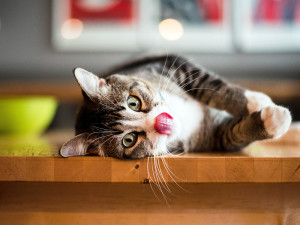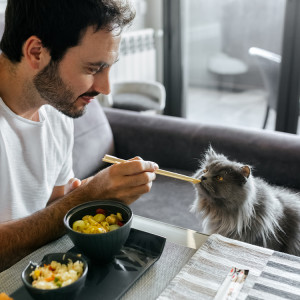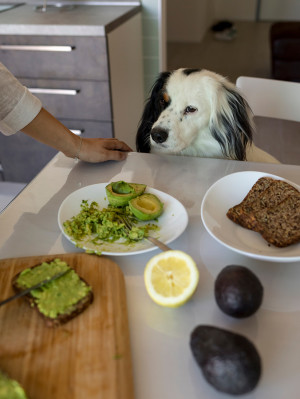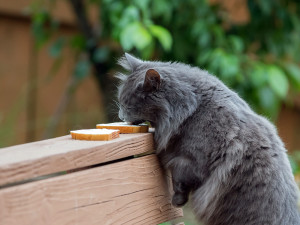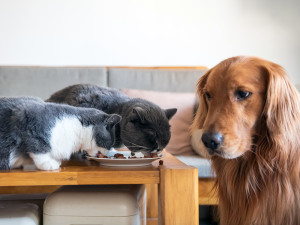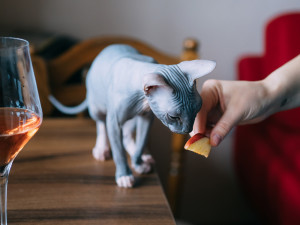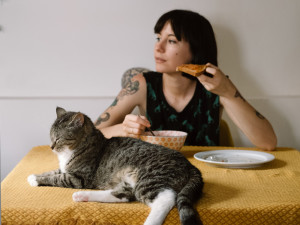Can Cats Eat Cinnamon?
You love the spice in your mulled wine and cider. Learn if your cat can enjoy it.
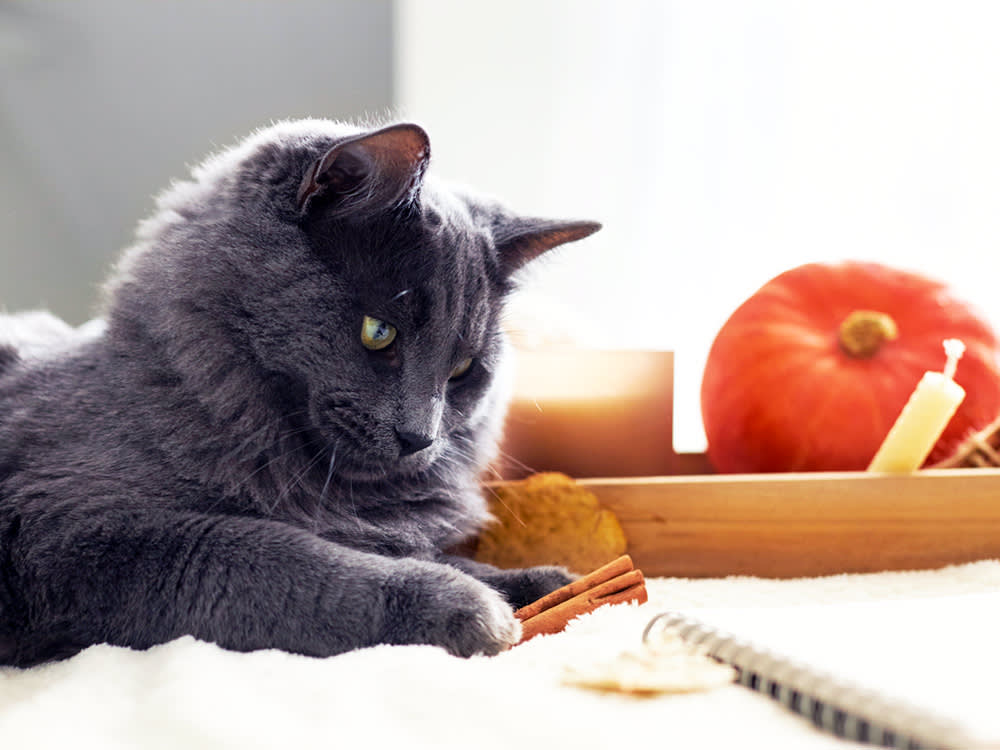
Share Article
Delicious and wintery, cinnamon is the secret ingredient for many delicious treats. But is this spice nice for cats? Can cats eat cinnamon? No, cats should not eat cinnamon — though vet Dr. Lindsay Butzeropens in a new tab assures us that the spice is unlikely to hurt our pets. To learn more, we spoke with Dr. Butzer about how to keep cats safe around cinnamon.
Is cinnamon toxic to cats?
No, cinnamon isn’t toxic to cats. That being said, Dr. Butzer cautions against sharing any of the spice with your kitty.

littleKin™ is Kinship’s home just for puppy and kitten parents. Bop over to check out expert advice, new pet tools, and special deals—all curated for your newest family member.
opens in a new tab“Cats can be sensitive to cinnamon, so it’s best to avoid giving it to them,” Dr. Butzer tells Kinship. “In small amounts, it’s unlikely to cause harm, but larger amounts can cause irritation or even be toxic.” Consumed in large amounts, cinnamon can have adverse effects for your catopens in a new tab, such as vomiting or diarrhea.
Nutrition facts for cats
Is cinnamon good for cats?
No, cinnamon is not good for cats. For humans, cinnamon can offer many health benefits, such as improving insulin resistance and reducing inflammation. Unfortunately, cats lack the enzymes needed to digest cinnamon, so they cannot absorb the spice or benefit from it at all.
How much cinnamon is toxic to cats?
Your cat would have to inhale or ingest more than a teaspoon of powdered cinnamon in order to experience serious adverse effects. But just like with humans, any amount of inhalation is likely to cause some irritation to your cat’s nasal passages — so don’t panic if they have a sneezing fit after inhaling any amount of cinnamon.
The larger danger is in the spice’s essential-oil form. Any amount of cinnamon’s essential oil essence can be toxic to cats through ingestion, inhalation, and topical exposure. Seek veterinary care immediately if you observe or suspect they have encountered cinnamon essential oil.
Are cinnamon sticks toxic to cats?
Cinnamon sticks contain approximately one teaspoon of cinnamon — which can be a dangerous dose for your cat. To avoid issues, don’t leave cinnamon sticks in unattended coffee and tea cups on counters or sinks. Even though it would mean they would have to consume the entire cinnamon stick to experience adverse effects, cinnamon sticks are also a choking hazard.
Is cinnamon essential oil toxic to cats?
Because they are concentrated essences, essential oils are extremely toxic to catsopens in a new tab — and adverse effects can occur from ingested, inhaled, and topical exposure. Cinnamon essential oil is no exception and any amount of the oil is toxic to your cat. It is recommended that you do not diffuse or use any type of essential oil in a home with a cat. If they come in contact with cinnamon essential oil, contact your vet immediately.
What are some spices and herbs that are safe for cats?
Catnip: Perhaps it goes without saying, but catnip is perfectly safe for your cat.opens in a new tab The ground herb can produce euphoria-like effects for them and is completely non-addictive. Catnip can also be good for their digestion and can even help with diarrheaopens in a new tab.
Turmeric: Turmeric is thought to have many health benefits for cats and humans alike. This golden spice is a natural antimicrobial and anti-inflammatory. Just to be safe, only give your cats small amounts of turmeric; it can have a laxative effect.
Cilantro: Cilantro (not to be confused with parsley — which cats should not have) is a perfectly safe herb that is chock full of minerals. However, cats might not like the taste — just like some humans.
What are some other spices that are not safe for cats?
Garlic and onion: Both cats and dogs can be harmed by the toxinsopens in a new tab found in garlic and onions. Therefore, you should never feed your cat anything that has been cooked or seasoned with garlic and onion.
Oregano: The oils in oregano cannot be absorbed by your cat’s body — which can lead to digestive upset. In its household spice form, oregano can cause gastrointestinal distress such as vomiting and diarrhea. However, in pure essential oil form, oregano can be lethal.
Tarragon: Similar to oregano, Tarragon can cause stomach issues for your cat — with the essential oil form being the most dangerous.
The bottom line: Is cinnamon poisonous to my cat?
No, cinnamon is not poisonous to your cat. In larger amounts, though, cinnamon powder can cause problems because cats cannot digest cinnamon. So, what should you do if your cat ingests household cinnamon? Simply keep an eye on them, Dr. Butzer suggests.
“If your cat ingests cinnamon, monitor them for any signs of distress or discomfort. If you notice any symptoms or are concerned about your cat’s wellbeing, don’t hesitate to contact your veterinarian for advice,” Dr. Butzer tells Kinship.
The story is a little different when it comes to cinnamon essential oils. Because essential oils are the concentrate of the thing cats can’t digest (the oil) any amount of ingesting, inhaling, or topical application can be dangerous to your kitty. Do not attempt to induce vomiting — instead contact your vet or a pet poison control hotline immediately.

Rebecca Caplan
Rebecca Caplan is a writer based in Brooklyn whose work has been featured in The New Yorker, Reductress, and Vulture. She lives in Brooklyn with her perfect, toothless dog Moose.
Related articles
- opens in a new tab
Can Dogs Eat Avocado?
Hold the avo toast, please.
![Dark grey cat eating two slices of break laid on top of a wooden railing of an outdoor deck]() opens in a new tab
opens in a new tabCan Cats Eat Bread?
Go ahead and give your carb-loving cat a few bites, but don’t hand over the bread basket.
![Two grey cats eating dog food from a plate while a brown dog looks on with jealousy]() opens in a new tab
opens in a new tabCan Cats Eat Dog Food?
It shouldn’t be their main course. Here’s why.
![A gray Sphynx cat sniffing an apple slice held out by her owner while standing on a table next to a glass of wine]() opens in a new tab
opens in a new tabCan Cats Eat Apples?
Yes, but the fruit might not hold much a-peel.
![A woman eating peanut butter toast with her cat laying on the table]() opens in a new tab
opens in a new tabCan Cats Eat Peanut Butter?
The sweet-and-salty treat is OK in moderation.
![A kitten sniffing a ripe half of an avocado in a bowl]() opens in a new tab
opens in a new tabCan Cats Eat Avocados?
Just don’t get out the guacamole bowl.
